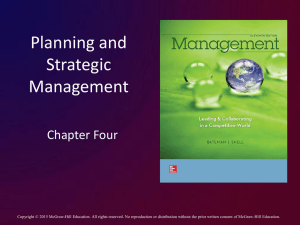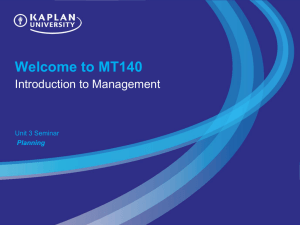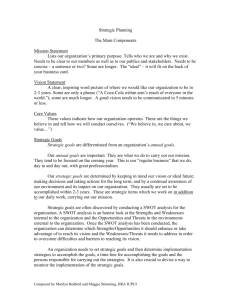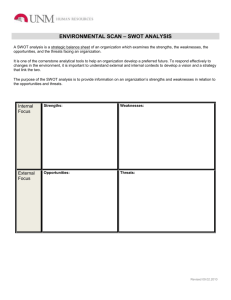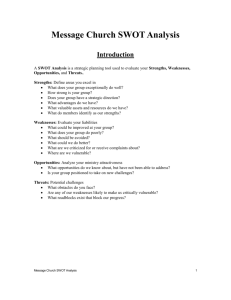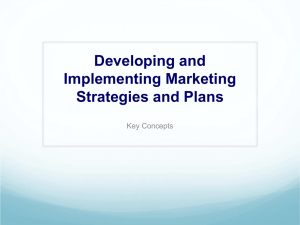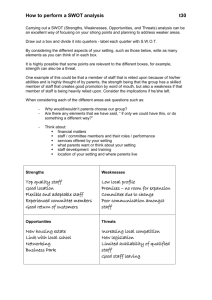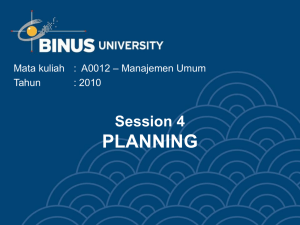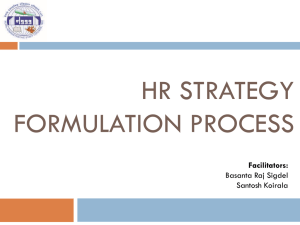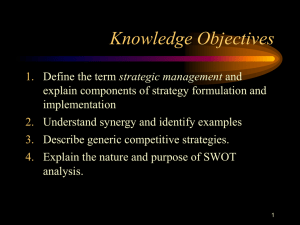Planning: Processes and Techniques
advertisement
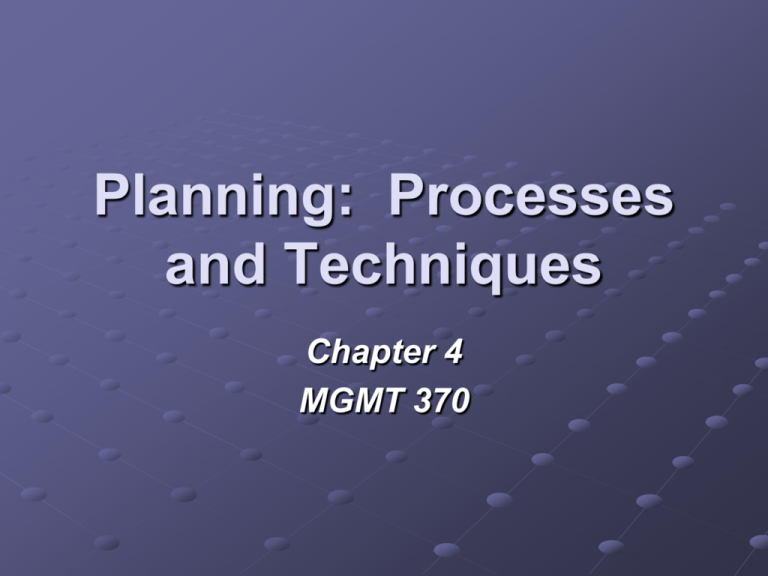
Planning: Processes and Techniques Chapter 4 MGMT 370 Managers Planning Why plan? Process Step 1 Situational Analysis Step 2 Alternative Goals and Plans Step 3 Goal and Plan Evaluation Step 4 Goal and Plan Selection Step 5 Implementation Step 6 Monitor and Control Decision Making Stages and Formal Planning Steps Situational Analysis A process planners use, within time and resource constraints, to gather, interpret, and summarize all information relevant to the planning issue under consideration. Alternative Goals and Plans Stress creativity and encourage managers and employees to think in broad terms about their jobs. Goal A target or end that management desires to reach Specific, measurable, attainable, relevant, time-bound - SMART Alternative Goals and Plans Plans The actions or means managers intend to use to achieve organizational goals Contingency plans sets of actions to be taken when a company’s initial plans have not worked well or if events in the external environment require a sudden change Benefits of Planning Focus and flexibility Action orientation Coordination Time management Control Goal and Plan Evaluation Managers will evaluate the advantages, disadvantages, and potential effects of each alternative goal and plan. Must prioritize those goals and even eliminate some of them. Managers must consider carefully the implications of alternative plans for meeting high priority goals. Goal and Plan Selection Managers will select the option that is most appropriate and feasible The evaluation process will identify the priorities and trade-offs among the goals and plans Scenario A narrative that describes a particular set of future conditions. Types of Managerial Plans Short-range vs. long-range Strategic Operational Policy Procedures or rules Budget Zero-based Project Implementation Managers and employees must understand the plan, have the resources to implement it, and be motivated to do so Successful implementation requires a plan to be linked to other systems in the organization, particularly the budget and reward systems Monitor and Control Managers must continually monitor the actual performance of their work units against the unit’s goals and plans. Manager’s also need to develop control systems to measure that performance and allow them to take corrective action when the plans are implemented improperly or when the situation changes Strategic Planning Strategic planning A set of procedures for making decisions about the organization’s long-term goals and strategies Strategic goals major targets or end results that relate to the long-term survival, value, and growth of the organization. Strategic Planning Strategy A pattern of actions and resource allocations designed to achieve the organization’s goals Strategic Planning 1. 2. 3. 4. Where will we be active? How will we get there? How will we win in the marketplace? How fast will we move and in what sequence will we make changes? 5. How will we obtain financial returns Hierarchy of Goals and Plans Tactical and Operational Planning Tactical planning A set of procedures for translating broad strategic goals and plans into specific goals and plans that are relevant to a distinct portion of the organization, such as a functional area like marketing. Tactical and Operational Planning Operational planning The process of identifying the specific procedures and processes required at lower levels of the organization. The Strategy Map Stategic Planning Strategic management A process that involves managers from all parts of the organization in the formulation and implementation of strategic goals and strategies Strategic Management Process Establishment of Mission, Vision, and Goals Mission An organization’s basic purpose and scope of operations Environmental Analysis Analysis of External Opportunities and Threats Stakeholders Groups and individuals who affect and are affected by the achievement of the organization’s mission, goals, and strategies Analysis of Internal Strengths and Weaknesses Resources Inputs to a system that can enhance performance Tangible, intangible assets Internal Resource Analysis Resources and Core Competencies Analysis of Internal Strengths and Weaknesses Benchmarking process of assessing how well one company’s basic functions and skills compare with those of another company or set of companies. goal of benchmarking is to thoroughly understand the “best practices” of other firms and to undertake actions to achieve both better performance and lower costs SWOT Analysis and Strategy Formulation SWOT analysis A comparison of strengths, weaknesses, opportunities, and threats that helps executives formulate strategy. SWOT Analysis and Strategy Formulation Corporate strategy The set of businesses, markets, or industries in which an organization competes and the distribution of resources among those entities Concentration A strategy employed for an organization that operates a single business and competes in a single industry. Summary of Corporate Strategies SWOT Analysis and Strategy Formulation Vertical integration The acquisition or development of new businesses that produce parts or components of the organization’s product Concentric diversification A strategy used to add new businesses that produce related products or are involved in related markets and activities. SWOT Analysis and Strategy Formulation Low-cost strategy A strategy an organization uses to build competitive advantage by being efficient and offering a standard, no-frills product Differentiation strategy A strategy an organization uses to build competitive advantage by being unique in its industry or market segment along one or more dimensions. Strategy Implementation 1. Define strategic risks 2. Assess organization capabilities 3. Develop an implementation agenda 4. Create an implementation plan Strategic Control Strategic control system A system designed to support managers in evaluating the organization’s progress regarding its strategy and, when discrepancies exist, taking corrective action. BCG Matrix
